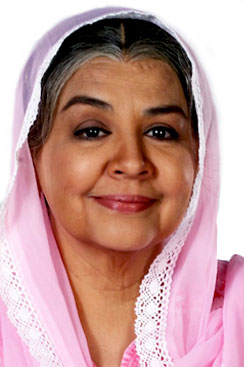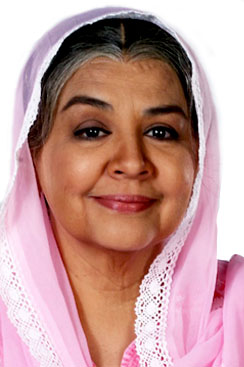Farida Jalal
Biography
Farida Jalal, a native of New Delhi, started her career in the 1960s, when she won the United Film Producers Talent Hunt sponsored by Filmfare. She usually played the sister or rejected fianc?e of the male lead but almost never the female lead. One of her most critically acclaimed roles is in Bobby where she played the part of the mentally challenged would-be fianc?e of Rishi Kapoor?s Raj. During the 1980s, her roles progressed from sister and girlfriend to aunt, mother, or nani. She is also remembered for her part in Aradhana, in which she plays Rajesh Khanna?s girlfriend, and sings the song "Bagon me bahar hai, kaliyon pe nikhar hai".She acted for over 40 years, only taking a break during 1983 and 1990, when she settled in Bangalore.
During the 1990s, Jalal had a part in many major hits in India, among them Raja Hindustani, Kuch Kuch Hota Hai, Dil To Pagal Hai, Kaho Naa... Pyaar Hai, Kabhi Khushi Kabhie Gham and Dilwale Dulhania Le Jayenge, for which she won a Filmfare Award for Best Supporting Actress. She acted in many television serials, such as in the hit sitcom, Dekh Bahi Dekh.
She was grandly acclaimed for her role in the 1994 film Mammo, for which she received the Filmfare Best Performance Award.
Jalal stars in Shararat (Thoda Jadu, Thodi Nazaakat), in which she plays a leading role. The comedy is currently air on the Disney Channel.
In 2005, she co-hosted the 50th Filmfare Awards alongside Saif Ali Khan and Sonali Bendre, in Mumbai. In 2008, she made a special appearance in the Punjabi film Yaariyan. Recently, she appeared in the soap opera Balika Vadhu.
Jalal was married to actor Tabrez Barmavar, who hails from Bhatkal and died in September 2003; they have a son named Yaseen. Farida Jalal though could not get a major break as heroine against any big star except Rajesh Khanna in Aaradhana, but she played the lead role in Jeevan Rekha in which her husband Tabrez was the hero. Pran and Ajit were also in the film. A song of the film ?Yaar mere, meri baahon me aaja? by Mohammed Rafi from this film had become popular, and is still popular.













